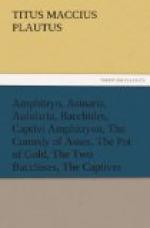Philippeo quidem. 220
Yes, and good coin of the realm.
Chrys.
Atque eo fortasse iam opust.
And furthermore, I dare say it’s needed soon.
Pistoc.
Immo etiam prius:
nam iam huc adveniet miles.
No, before that, even: for a Captain’s due here soon.
Chrys.
Et miles quidem?
Indeed? A Captain, too?
Pistoc.
Qui de amittenda Bacchide aurum hic exiget.
Who’ll be after money for letting Bacchis go.
Chrys.
Veniat quando volt, atque ita ne mihi sit morae. domist: non metuo nec ego quoiquam supplico, dum quidem hoc valebit pectus perfidia meum. abi intro, ego hic curabo. tu intus dicito Mnesilochum adesse Bacchidi.
(airily) Let him come when he wants, yes, and let him take care not to keep me waiting. I’m provided: I fear no man and supplicate no man, not I,—at least as long as this heart of mine can prompt a good stiff lie. Inside with you: (grandly waving Pistoclerus in) I’ll take charge here myself. You tell Bacchis in there that she may expect Mnesilochus at once.
Pistoc.
Faciam ut iubes.
Very well. [EXIT.
Chrys.
Negotium hoc ad me adtinet aurarium. mille et ducentos Philippum attulimus aureos 230 Epheso, quos hospes debuit nostro seni. inde ego hodie aliquam machinabor machinam, unde aurum efficiam amanti erili filio. sed foris concrepuit nostra: quinam exit foras?
It’s my look out, this business of the exchequer. We’ve brought twelve hundred sovereigns from Ephesus, money a friend there owed our old man. I’ll machinate some machinations to-day for transferring part of said gold to my lovesick young master. (listening) But there goes our door! Wonder who’s coming out. (steps aside)
II. 3.
Scene 3.
ENTER Nicobulus FROM HIS HOUSE.
Nic.
Ibo in Piraeum, visam ecquae advenerit in portum ex Epheso navis mercatoria. nam meus formidat animus, nostrum tam diu ibi desidere neque redire filium.
I’ll walk
down to the Piraeus and see if any merchantman
has come in from
Ephesus. It worries me to have my son
dilly-dallying
there so long and not returning.
Chrys.




